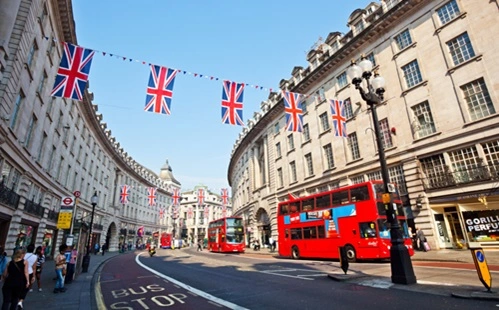England is known worldwide for its iconic landmarks, rich history, and influence on art, literature, and politics. But beyond Big Ben and afternoon tea, England is packed with quirky traditions, cultural oddities, and surprising facts. Here are over 10 fun and interesting facts about England that showcase its unique charm and lasting impact on the world.

1. Home to the World’s Oldest Operating Amusement Park
England is home to the world’s oldest amusement park still in operation: Blackgang Chine on the Isle of Wight. Opened in 1843, Blackgang Chine has delighted visitors for nearly two centuries with its unique blend of natural scenery, historical attractions, and whimsical themes. In addition to rides, the park is known for its Dinosaur Land and fairy-tale-inspired attractions.
2. Tea: The National Drink and an Essential Ritual
It’s no secret that England loves tea, but the extent of the nation’s tea obsession is impressive. The British drink around 165 million cups of tea each day, averaging about 36 billion cups annually! Tea has been an integral part of British culture since the 17th century, with afternoon tea becoming a popular ritual in the Victorian era. Today, tea remains a comforting staple in English households and is often served with milk and occasionally sugar.
3. The English Accent Varied Significantly Over Time and Location
Although England is relatively small, it has a remarkable diversity of regional accents and dialects. Within the space of just a few miles, accents can change noticeably. London alone has several distinct accents, such as Cockney and Received Pronunciation, the latter commonly known as the “Queen’s English.” Accents vary significantly across the country, from the Geordie accent of Newcastle to the Brummie accent of Birmingham and the Scouse accent of Liverpool, reflecting England’s rich linguistic history.
4. England’s Royal Family is the Oldest Monarchy in the World
The British monarchy, with roots dating back over a thousand years, is one of the oldest continuous monarchies in the world. Queen Elizabeth II, the longest-reigning British monarch, ruled for over 70 years before her passing in 2022. The monarchy remains an important symbol in England and across the Commonwealth, with royal events, traditions, and tours attracting millions of visitors annually.
5. Home to the First Modern Olympic Games
While ancient Greece hosted the first Olympics, the first modern international Olympic Games were held in Much Wenlock, a small town in Shropshire, England. Known as the Wenlock Olympian Games, they began in 1850 and inspired the revival of the modern Olympic Games. This local event continues to this day, showcasing England’s role in revitalizing the international Olympic movement, which officially resumed in Athens in 1896.
6. Fish and Chips: A Quintessential English Dish
Fish and chips is an iconic English dish with a surprisingly complex history. The fried fish concept was brought to England by Jewish immigrants from Portugal and Spain in the 16th century, and the idea of “chips” (French fries) was introduced in the 1800s. Together, they formed the classic fish and chips meal, first sold as a takeaway dish in East London. Today, it’s a beloved staple across the country and a must-try for visitors.
7. The UK’s Smallest City is Just Over 400 People Strong
England is home to the smallest city in the UK: St. David’s in Pembrokeshire, with a population of just over 400 people. Despite its size, St. David’s is considered a city due to the presence of its stunning medieval cathedral. England has a special title system where some small towns achieve city status, not based on population but on having a cathedral, an old English tradition still respected today.
8. Stonehenge is Older Than the Pyramids of Giza
One of England’s most famous landmarks, Stonehenge, is actually older than Egypt’s Pyramids of Giza. Built approximately 5,000 years ago during the late Neolithic period, Stonehenge’s original purpose remains a mystery. Some researchers believe it was an ancient burial site, while others think it served as an astronomical calendar or ceremonial gathering place. Stonehenge continues to attract archaeologists and curious visitors from around the world.
9. The English Language Has the Most Words
English is one of the richest languages in terms of vocabulary, with over 170,000 words in current use, according to the Oxford English Dictionary. This diverse vocabulary comes from a unique blend of influences, as English evolved from Anglo-Saxon, Norman French, Latin, Greek, and many other languages. As a result, English speakers have access to a wide range of words for expressing nuances, moods, and tones.
10. The London Underground is the World’s Oldest Subway System
The London Underground, commonly known as the “Tube,” is the oldest subway system in the world. Opened in 1863, the first trains ran on steam, and it has since expanded into a modern rapid transit system serving over a billion passengers annually. The Tube has a rich history and distinctive map design, with some of its stations rumored to be haunted. For travelers, it’s an iconic part of the London experience and a practical way to navigate the city.
11. Pubs Have Been Around Since Roman Times
England’s pub culture dates back centuries, with the first pubs, or “public houses,” established during the Roman occupation around 43 CE. These early “tabernae” were places for locals to gather and socialize over a drink. Today, pubs are an essential part of English culture, and you can still find establishments dating back hundreds of years, such as Ye Olde Fighting Cocks in St. Albans, which claims to be England’s oldest pub. The pub scene remains strong, with local pubs continuing to serve as community gathering spots.
12. The Most Haunted Country in the World
England has a rich folklore surrounding ghost stories, and it’s known as one of the most haunted countries in the world. With its ancient castles, battle sites, and centuries-old architecture, England is full of places rumored to be haunted. Sites like the Tower of London, Hampton Court Palace, and the city of York are particularly known for their ghostly legends, and ghost tours are popular in many historic towns and cities.
13. British Pantomime: A Holiday Tradition Like No Other
Every holiday season, British theaters come alive with the unique tradition of pantomime. This interactive theatrical performance blends fairy tales, comedy, slapstick humor, and audience participation, typically performed around Christmas. Pantomime’s roots trace back to the 16th century Italian commedia dell’arte, but it evolved into a distinctly British holiday tradition. The shows often include actors in drag and a lively, family-friendly atmosphere that’s hard to find elsewhere.
14. The English Flag, the Cross of St. George, Dates Back to the Middle Ages
The English flag, known as the Cross of St. George, features a red cross on a white background and has been in use since the Middle Ages. St. George is England’s patron saint, and his cross became associated with England during the Crusades. The flag remains a symbol of English identity, distinct from the Union Jack, which represents the United Kingdom.
15. A Deep Love of Gardens and Horticulture
England is famous for its gardens, with a long-standing love of horticulture that dates back centuries. From the sprawling gardens of historic estates like Kew Gardens and the grounds of Hampton Court Palace to charming village gardens, the English have perfected the art of gardening. England is home to the Royal Horticultural Society, and its famous Chelsea Flower Show draws visitors from around the world each year, showcasing impressive plant displays and garden designs.
England offers far more than iconic landmarks and world-famous royals. With its fascinating mix of history, unique customs, and cultural contributions, England continues to captivate visitors and influence global trends. Whether you’re sipping tea, visiting Stonehenge, or exploring a haunted castle, England’s rich history and vibrant traditions make it a fascinating place to explore. Each region brings its own quirks and customs, making England a diverse and endlessly interesting destination for travelers and history buffs alike.


